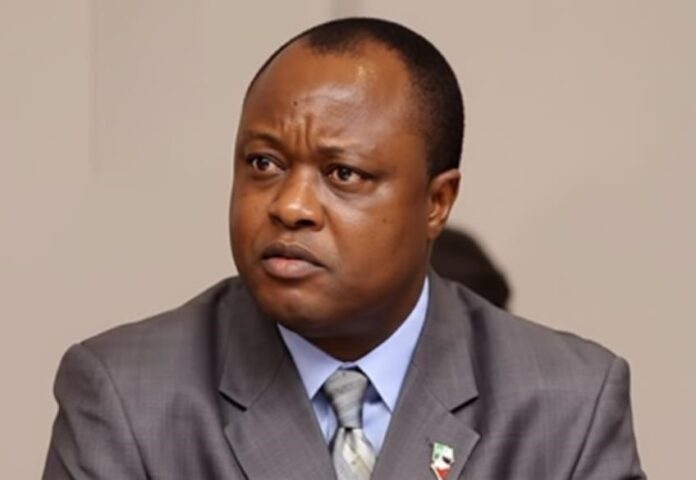By Tamba Kaimondo Kpaika
Former vice president Alhaji Chief Sam Sumana will not be eligible to contest for the All People’s Congress (APC) leadership in 2026, following judicial rulings that effectively bar his candidacy.
Sam Sumana has often maintained that his exclusion is the result of discrimination within the APC. However, court judgments – not internal party politics – are the decisive factor in his ineligibility.
His expulsion from the APC initially drew controversy. Hon. I.B. Kargbo, who chaired the committee that investigated him, said the decision was based on testimonies from people within Sumana’s own district of Kono. Despite tensions, including Sumana’s criticism of the APC during the 2018 elections and his absence of support in the runoff, the party later reintegrated him through a reconciliation letter signed by then Secretary General Ambassador Osman Foday Yansaneh.
What began as an internal party process has since escalated into a matter settled by the courts. While some have described it as a “constitutional crisis,” legal rulings confirm that the issue rests firmly within the judiciary’s domain, not party politics.
When examined through the lens of legal interpretation, the controversy surrounding Sam Sumana’s eligibility is not a constitutional crisis. It is the foreseeable outcome of two definitive High Court rulings in 2022, compounded by Sam Sumana’s refusal to heed sound counsel.
Supporters frame the issue as a test of political fairness; detractors dismiss it as a legal dead end. But the APC Constitution is unambiguous: Article 35(4), alongside Article 56(b), mandates a minimum of five years’ continuous membership to qualify for party leadership.
Some allege that this clause was deliberately inserted into the revised constitution to bar Sam Sumana from contesting. Yet the record contradicts that claim. Efforts to reinstate his membership began well before the new constitution was adopted.
In September 2020, Ambassador Yansaneh issued a letter announcing Sam Sumana’s reinstatement, contingent upon ratification by a delegates’ conference. In early 2022, Interim Transitional Governance Committee (ITGC) Chairman Alfred Peter Conteh publicly declared that Sam Sumana had been readmitted. Both actions, however, were later invalidated by the courts, not due to malice, but due to a lack of lawful authority under both the APC and national constitutions.
In Alfred Peter Conteh v. Ernest Bai Koroma & the All People’s Congress, Justice Adrian Fisher issued a landmark ruling that dismantled the APC’s National Executive and National Advisory Committee (NAC). The court found that both bodies were illegally constituted, with members appointed rather than democratically elected, violating the APC Constitution (1995) and the Sierra Leone Constitution (1991).
This judgment immediately nullified the NAC’s decision-making powers, retroactively voiding Yansaneh’s reinstatement letter. Justice Fisher was unequivocal: actions taken by an illegitimate body “cannot be recognized in law.”
The second ruling came in November 2022, when Justice Fisher addressed a contempt application against Conteh. His unilateral announcement of Sam Sumana’s readmission was deemed unlawful. Membership matters, Fisher clarified, must be handled by a five-member ITGC subcommittee and ratified by a properly convened National Delegates Conference.
Alfred Prter Conteh’s declaration, like Osman Foday Yansaneh’s before it, was nullified. The court reinforced a critical principle: no individual, regardless of rank, may circumvent constitutionally mandated procedures.
Justice Fisher’s rulings did more than resolve a membership dispute; they set a precedent that institutional legitimacy must trump political expediency. These twin rulings effectively dismantled every pre-2023 pathway to Sam Sumana’s readmission. At the time the APC convened its 2023 National Delegates Conference, the only lawful route to restore his membership was through the general amnesty granted at that event. This amnesty did, in fact, reinstate him in full compliance with the November 2022 ruling.
However, reinstatement in 2023 did not erase the constitutional requirement of five years’ continuous membership. By simple arithmetic, Sam Sumana will not meet that threshold until 2028.
While Section 41 of the Sierra Leone Constitution outlines the basic qualifications for presidential candidates, including party membership, it does not prohibit political parties from imposing additional internal criteria. By remaining silent on the matter, the constitution implicitly affirms the autonomy of political parties to regulate their own affairs; an autonomy the APC has exercised through its five-year membership standard.
Sam Sumana’s continued assertion of eligibility rests on a foundation the courts have already dismantled. Supporters allege political sabotage and argue that Sam Sumana’s ineligibility undermines democratic plurality within the APC.
Yet this view overlooks the foundational principle that legitimacy stems not from popularity, but from adherence to due process. Critics argue that further litigation would serve only to delay the APC’s preparations for 2028. If anything, Justice Fisher’s rulings serve as a cautionary precedent: no leader, faction, or ambition can override the party’s governing documents.
Following the 2023 National Delegates Conference, Sam Sumana’s reinstatement was lawful, sanctioned, and final. The question of his eligibility for the 2026 leadership contest is settled; not by political manoeuvring, but by the unyielding letter of the law. Any further legal challenge will not be seen as a fight for inclusion, but as a tactical manoeuvre to derail the APC’s disciplined march toward 2028; a march now fortified by the rule of law, not the whims of ambition.




